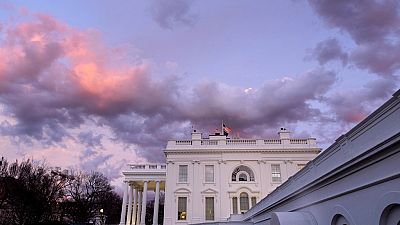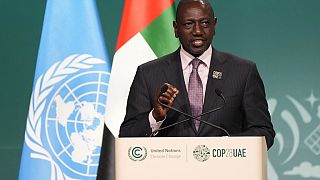Kenya
President Joe Biden plans to welcome Kenyan President William Ruto to the White House in May, hosting a state visit after reneging on his promise to visit Africa last year.
White House press secretary Karine Jean-Pierre announced Friday that the visit set for May 23 will mark the 60th anniversary of U.S.-Kenya diplomatic relations and "celebrate a partnership that is delivering for the people" of both countries while affirming "our strategic partnership" with Ruto's country.
It "will strengthen our shared commitment to advance peace and security, expand our economic ties, and stand together in defense of democratic values," Jean-Pierre said in a statement. "The leaders will discuss ways to bolster our cooperation in areas including people-to-people ties, trade and investment, technological innovation, climate and clean energy, health, and security."
Word of Ruto's visit comes after Haiti announced this week that it is working on an official agreement with Kenyan officials to secure the long-awaited deployment of Kenyan police forces there. High-ranking officials from both countries recently met in the U.S. for three days to draft a memorandum of understanding and set a deadline for the arrival of forces in Haiti from the east African country.
Jean-Pierre added Friday that, beyond Kenya, Rutto's visit to Washington will "further the vision" that "African leadership is essential to addressing global priorities."
The White House also confirmed that both Ruto and Kenyan First Lady Rachel Ruto will be honored with a dinner. Biden hosted a state dinner celebrating close ally Australia in October, which followed the president's skipping a stop in that country earlier in 2023 to focus on debt limit talks in Washington. But those festivities last fall were toned down some given Israel's ongoing war with Hamas.
Biden said in December 2022 that he would visit sub-Saharan Africa the following year, which would have made him the first U.S. president to travel there in a decade. The president pledged at the end of a U.S.-Africa Leaders Summit in Washington with 49 leaders, in which he suggested the continent would be a strategic focus as the U.S. made political and financial commitments.
But other priorities interceded in 2023. Biden pulled off last-minute trips to Israel and Vietnam, as well as a secretive journey to Ukraine. He ended last year by skipping a December U.N. climate change conference in Dubai, while sending Vice President Kamala Harris in his place, and never scheduled an Africa trip.
Biden is now seeking reelection in November's election while juggling a host of pressing foreign security matters, including the Israel-Hamas war and continuing discussion in Congress over proposed foreign aid for Ukraine amid its war with Russia.
On Friday he's traveling to East Palestine, Ohio, making good on months of saying he'd visit the site of a Norfolk Southern train derailment that spilled a cocktail of hazardous chemicals and caught fire in February 2023.
As Biden was preparing for that trip, Vice President Kamala spoke Friday at the Munich Security Conference and was asked about Washington's "growing transitional mindset" toward Africa — a characterization she disputed, countering that "the future has to be about partnership and investment."
"I believe that we must think differently about the relationship between the United States and the continent of Africa," the vice president said, adding, "We look at the future of the continent and how it will affect the world: It is indisputable. There will be a direct impact."
Harris noted that the median age on the African continent is 19 and that population growth means that, in coming decades, as many as 1 in 4 people in the world will live there.
"In terms of the future, we must see the innovation that is currently happening there and partner with African leaders and nations," she said. "And change the way we are thinking, in a way that is not about aid, but about partnership. Not what we do for the continent, but what we do with the continent and its leaders."














00:52
Nigeria’s Peter Obi to contest 2027 election, opposition coalition in jeopardy
Go to video
Cameroon’s Tourism Minister joins presidential race as Biya’s silence fuels uncertainty
Go to video
INTERPOL seizes $65M in fake drugs, arrests 769 in largest-ever global crackdown
01:40
Kenya protests turn violent as court, activists demand justice for victims of police brutality
Go to video
Uganda's Museveni breaks African silence on Israel-Iran war
Go to video
Over 40 killed in attack on Sudanese hospital: WHO Chief condemns “Appalling” strike